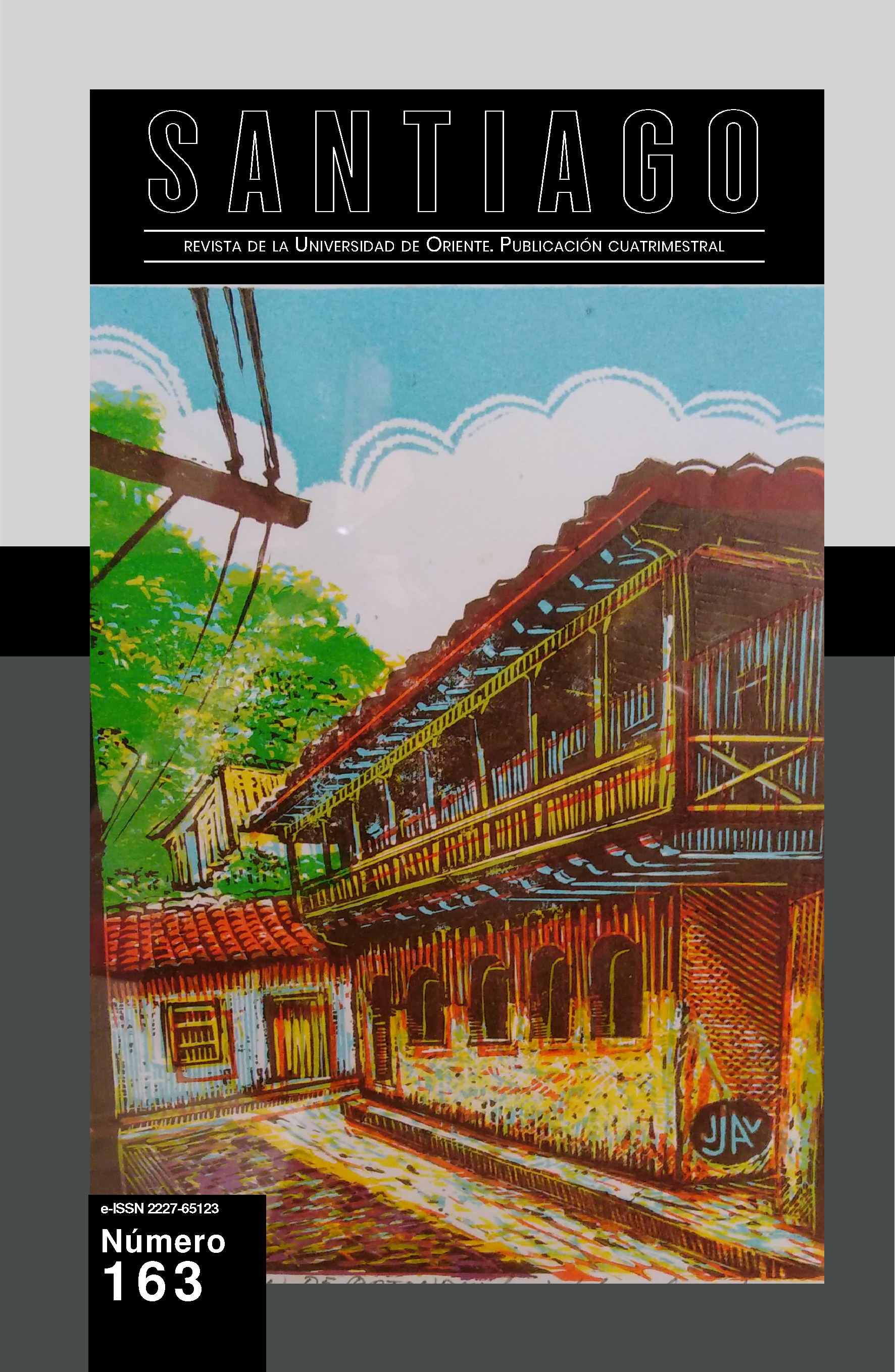Context and evidentiality in reports from the “Juventud Rebelde” cuban newspaper
Keywords:
citational evidentiality; reporting evidentiality; discursive context; linguistic functionalism.Abstract
This research shows the study of evidentiality as the conceptual-functional
category responsible for demonstrating the source of information declared in a speech. The investigation of this linguistic category is based
on reports from the newspaper “Juventud Rebelde” which shows
the analysis of this journalistic genre as a textual typology that serves to
observe the functions performed by the evidential units chosen in the
construction of effects of contextual meanings generated by them, such
as textual coherence and cohesion. The research is carried out from
the functionalist basis of the Discursive-Functional Grammar of Hengeveld
and Mackenzie (2008) and under the guidelines of a qualitative
methodology supported by quantitative tools. It is aimed to identify the
different uses of the citation and reportive subtypes (elements of the Interpersonal
Level of the Grammatical Component) and the Contextual
Component in discursive construction. This investigation contributes to
study in depth this category from the functionalist perspective, which is
under-researched in linguistic studies in Cuba.
References
Aikhenvald, A. Y. (2004). Evidentiality. Oxford University Press.
Bermúdez, F. (2006): Evidencialidad: La codificación lingüística del punto de
vista / Evidentiality: Tesis doctoral. Universidad de Estocolmo.
Caldas, J. E. Prata, P. P. N. y Silva, I. L. (2018). La evidencialidad en noticias
escritas en lengua española. Domínios de Lingu@gem 12(3) | 1485-
http://www.repositorio.ufc.br/handle/riufc/52681
Casalmiglia, E. y Tusón, A. (1999). Las cosas del decir: Manual de análisis del
discurso. Barcelona, España. Editorial Ariel.
Cavazzino, V. (2021). El reportaje narrativo como género periodístico en España
entre la literatura y el periodismo. Comunicación y Sociedad, e7751.
https://doi.org/10.32870/cys.v2021.7751
Connolly, J. H. (2014). The contextual component within a dynamic implementation
of the FDG model: structure and interaction. 2014. Revista
Pragmatics, V. 24, p. 229-248.
Chacón, P. (24 de abril de 2021). Reportaje: qué es, características, estructura,
tipos de reportaje y pautas de elaboración. Obtenido de Tipos de arte:
https://tiposdearte.com/literatura/tipos/escrita/texto/texto-nn-literario/
periodistico/reportaje
Echevarría, Ll. B. (1998): Las W´s del reportaje. Fundación universitaria San
Pablo CEU, Valencia.
Euroinnova. (2021). Temas de reportajes: pasos para hacerlo. Obtenido de
Blog de temas de reportajes: https://www.euroinnova.edu.es/blog/temas-
de-reportaje.
Gómez, D. (2016). Fases del reportaje: Redacción (Estructura del reportaje).
Obtenido de Conociendo géneros periodísticos: https://conociendogeneros.
wordpress.com/2016/04/09/fases-del-reportaje-redaccionestructura-
del-reportaje
Gonzales, C. (2020). Análisis de reportajes publicados por el diario The New
York Times en redes sociales sobre la realidad de América Latina en
en Socialium revista científica de Ciencias Sociales, Vol. 4 - No.
, julio - diciembre 2020, pág. 1-10. DOI https://doi.org/10.26490/
uncp.sl.2020.4.2.642
Hengeveld, H. y Fisher, R. (2018). A’ingae (Cofán/Kofán) Operators. Open
Linguistics, 4, 328-355. https://doi.org/10.1515/opli-2018-0018
Hengeveld, K. y Hattnher, M. M. (2015). Four types of evidentiality in the
native languages of Brazil. Linguistics, 53(3), 479-524. https://doi.
org/10.1515/ling-2015-0010
Hengeveld, K. y Mackenzie, L. (2008). Functional Discourse Grammar. A
typologically based theory of language structure. Oxford University
Press.
Hengeveld, K. y Mackenzie, L. (2011). La Gramática Discursivo-Funcional.
Traducción de Daniel García Velasco. Moenia, 17, 5-45. http://www.
usc.es/revistas/index.php/moenia/article/view/205
Hernández, I; Guerra, A y Ulloa, T. (2022). Los marcadores evidenciales en
el estilo funcional periodístico: el caso del reportaje, en, Introducción
a la Estilística de la lengua de Josef Dubsky... 50 años después. Ediciones
UO, ISBN: 978-959-207-687-7, 212-233. https://ediciones.uo.edu
index.php/e1.cu/ /catalog estilistica-dubsky-50 /book/
Hernández, I. Prata, N.P.P. Guerra, A. y Ulloa, T. (2023). La evidencialidad
citativa o reportativa en reportajes escritos en español. Káñina,
Rev. Artes y Letras, Univ. de Costa Rica XLVII (3) (Septiembre-Diciembre)
: 199-225/ISSNe: 2215-2636. https://doi.org/10.15517/
rk.v47i3.57923
León, H. (2021). La ciudad después de la calma. Juventud Rebelde. pp. 2-3.
López, A. (2018). El periodismo que contará el futuro. Revista De Comunicación.
Obtenido de https://doi.org/10.26441/RC19.2-2020-R1
Martín Vivaldi, G. (1980). Géneros periodísticos. 6.ª edición. Paraninfo.
ISBN: 9788428303613
Méndez, E (1999). Análisis de la reproducción del discurso ajeno en los textos
periodísticos. Pragmalingüística, (7), 99-128. http://revistas.uca.es/
index.php/pragma/article/viewFile/502/436
Montagaud, N. (2021). Las 8 partes de un reportaje (y sus características). Obtenido
de Psicología y Mente: https://psicologiaymente.com/cultura/
partes-reportaje
Morales, J. Hernández, Y; Rodríguez, N. Menéndez, M. Vázquez, L.R y Uria,
S. (9 de enero 2021). Protección urgente y personalizada. Juventud
Rebelde. pp. 4-5.
Pérez, G. Y.; Portal, J. L. (2017): De la expresión formal de la discordancia
discursiva en la reproducción del discurso ajeno en el periódico juventud
rebelde, en Instituto de Literatura y Lingüística. Cuba. Estudios
Lingüísticos, ISBN 978-959-7152-37-8.
Downloads
Published
Issue
Section
License
Copyright (c) 2024 Ingrid Hernández-Moya, Pessoa Prata Nadja-Paulino, Tania Ulloa-Casaña, Ana María Guerra-Casanellas

This work is licensed under a Creative Commons Attribution-NonCommercial-NoDerivatives 4.0 International License.
CC Reconocimiento-NoComercial-SinObrasDerivadas 4.0



.jpg)

_de_logo.jpg)













